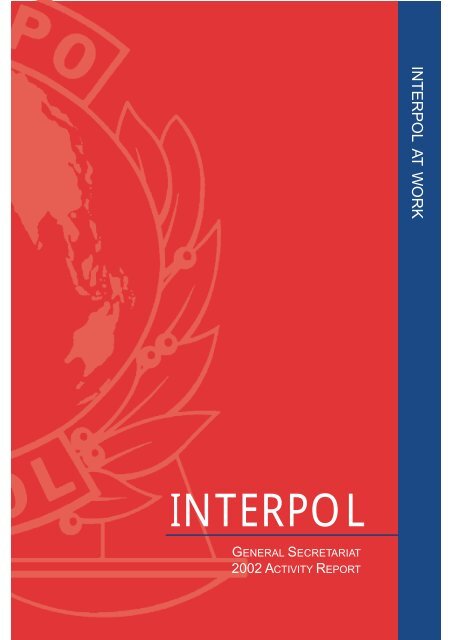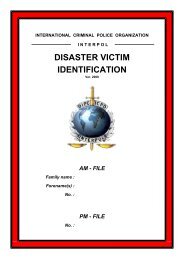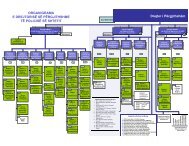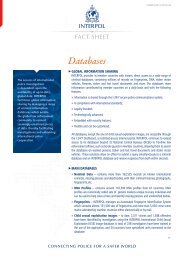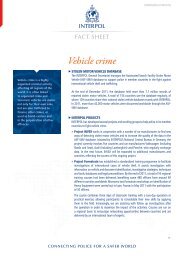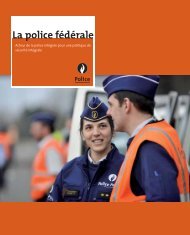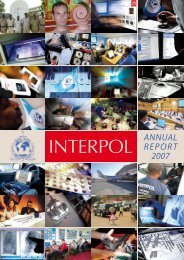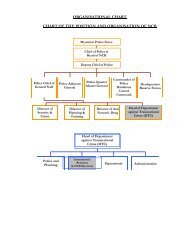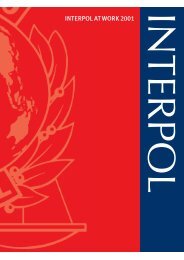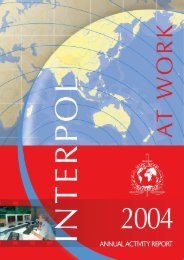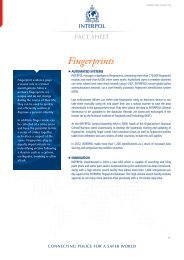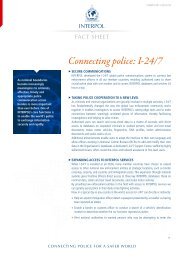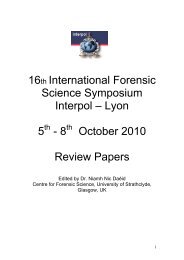Download - Interpol
Download - Interpol
Download - Interpol
You also want an ePaper? Increase the reach of your titles
YUMPU automatically turns print PDFs into web optimized ePapers that Google loves.
INTERPOL AT WORK<br />
INTERPOL<br />
GENERAL SECRETARIAT<br />
2002 ACTIVITY REPORT
CONTENTS<br />
Foreword 1<br />
ACTION LINE 1 IMPROVING PERFORMANCE 2<br />
ACTION LINE 2 IMPROVING NCB PERFORMANCE 4<br />
ACTION LINE 3 PROVIDE MORE REGIONAL SERVICES 4<br />
ACTION LINE 4<br />
DEVELOP INTERPOL’S LEGAL FRAMEWORK<br />
AND REVIEW ITS INTERNAL DECISION-MAKING PROCESS 6<br />
ACTION LINE 5 PROGRESS KEY PROJECTS 7<br />
ACTION LINE 6<br />
ACTION LINE 7<br />
ACTION LINE 8<br />
RAISE INTERPOL’S PROFILE AND ENHANCE<br />
INTERNAL COMMUNICATIONS 11<br />
ENHANCE INTERNATIONAL RELATIONSHIPS AND<br />
DEVELOP AN APPROPRIATE FRAMEWORK 12<br />
IMPLEMENTING A NEW BUDGET STRUCTURE,<br />
FINANCIAL PLANNING AND MANAGEMENT MECHANISMS 12<br />
ACTION LINE 9 INCREASE REVENUES 13<br />
ACTION LINE 10 MODERNIZE SUPPORT ACTIONS 13<br />
PERSONNEL MATTERS 14<br />
FINANCIAL STATEMENT 14
Foreword<br />
2002 has been a year of improving our efficiencies<br />
and service to member countries. In the<br />
aftermath of 11 September 2001, <strong>Interpol</strong>’s<br />
General Secretariat reorganized in order to<br />
provide real-time services 24 hours a day and 7<br />
days a week, and we designed a structure that<br />
focused on enhancing our operational, regional<br />
and specialized crime expertise. We are pleased<br />
to say that the reorganization of the General<br />
Secretariat has begun to reap real benefits,<br />
highlights of which form the basis of this report.<br />
Our commitment is to provide increasingly<br />
focused operational support for our police<br />
colleagues worldwide through a wide range of<br />
new initiatives. First, we improved the way in<br />
which we assisted member countries in notifying<br />
one another about wanted fugitives or important<br />
crime problems. In 2002, we processed more<br />
wanted persons notices and requests for<br />
assistance by member countries than ever before.<br />
<strong>Interpol</strong> has undertaken an ambitious initiative to<br />
connect all of its member countries to its new<br />
global communication system, which we call I-<br />
24/7, to reflect the new <strong>Interpol</strong> commitment to<br />
around- the-clock worldwide service. I-24/7 will<br />
bring the power of <strong>Interpol</strong>’s network and<br />
databases to the fingertips of its National Central<br />
Bureaus and member country police forces<br />
around the world by extending the reach of<br />
<strong>Interpol</strong> to border checkpoints and to police<br />
officers in the field.<br />
We also moved from being a passive fugitivehunting<br />
to an active fugitive-hunting<br />
organization. We thus created a Fugitive<br />
Investigative Support team, which through its<br />
flexibility and determination has assisted in the<br />
location and arrest of a number of international<br />
criminals, some of whom have been on the run<br />
for over ten years. Similarly, our Crimes Against<br />
Children team has demonstrated the<br />
extraordinary added value that <strong>Interpol</strong> provides<br />
by helping member countries develop over 5,000<br />
search and arrest warrants for suspected<br />
subscribers or pay-to-view users of child<br />
pornography via the Internet based on<br />
information received from one country. Many of<br />
the resulting internationally co-ordinated arrests<br />
were dramatized in the world’s press.<br />
<strong>Interpol</strong>’s becoming a more modern, more<br />
dynamic player in the field of international police<br />
co-operation has neither been simple nor painfree.<br />
But, as they say, no pain, no gain. It is only<br />
right that I should thank the President, the<br />
Executive Committee, and especially my staff at<br />
the General Secretariat, for responding to the<br />
ongoing challenges time and again, beyond<br />
anything I could have hoped. But recognition is<br />
also due to the men and women who serve in the<br />
National Central Bureaus – the national <strong>Interpol</strong><br />
offices – which are the vital link in the <strong>Interpol</strong><br />
communication chain and who serve in police<br />
forces throughout the world. It is through strong<br />
partnerships with these people, and their<br />
standing in their national services, that <strong>Interpol</strong><br />
succeeds.<br />
Finally, 2002 has also been important because<br />
Afghanistan and East Timor have joined the<br />
<strong>Interpol</strong> family. I wish them every success in their<br />
efforts against the international criminal<br />
elements that threaten their hard-won stability.<br />
Ronald K. Noble<br />
Secretary General<br />
1
2<br />
Action Line 1 - Improving performance<br />
Criminal data processing<br />
Messages<br />
Three million messages transited <strong>Interpol</strong>’s<br />
communication network in 2002, an increase of<br />
nearly 2% over 2001. In this first full year of 24/7<br />
working, 36% of criminal data processing activity<br />
took place during what would previously have<br />
been closure time in Lyon - night-time, weekends<br />
and bank holidays. The total increase in messages<br />
exchanged over the year is small in comparison<br />
with the 6% increase year on year in 2001.<br />
Nevertheless, round-the-clock working has<br />
improved response times which represents a<br />
major step forward in the quality of service<br />
delivery.<br />
Africa<br />
The Americas<br />
Asia<br />
Europe<br />
North Africa & Middle East<br />
Oceania<br />
Over 30,000 valid notices and diffusions<br />
There has been a steady rise in the use of <strong>Interpol</strong><br />
notices and diffusions over the past five years,<br />
which indicates that the service is increasingly<br />
recognized as a relevant and effective means of<br />
progressing international cases.<br />
At the end of 2002, there were nearly 11,000 valid<br />
<strong>Interpol</strong> notices in circulation, an increase of<br />
7.5% on the previous year. Some 2,000 of these<br />
were newly created during the year, about 50% of<br />
which were requested using the new electronic<br />
notice request system via the secure website.<br />
This represents 26% of the membership (47<br />
countries). This process has allowed a huge<br />
increase in the speed of production of notices –<br />
from, in some cases, several months to just a few<br />
hours.<br />
Diffusions are requests for location and arrest<br />
issued by <strong>Interpol</strong> member countries themselves<br />
using the <strong>Interpol</strong> communication system. During<br />
the year, 7,500 new diffusions were circulated, an<br />
increase of 11% over 2001. From previous years,<br />
11,500 remained valid so there was an overall 23%<br />
rise in the number of valid diffusions.<br />
Over 1,200 individuals were arrested around the<br />
world as a result of an <strong>Interpol</strong> notice or diffusion.<br />
Red<br />
Yellow<br />
Blue<br />
Green<br />
Black<br />
Red Yellow Blue Green Black<br />
Electronic notice requests 2002<br />
<strong>Interpol</strong> databases<br />
The stolen motor vehicle database is by far the<br />
largest, and is automatically maintained on a<br />
round-the-clock basis by participating countries<br />
uploading data from their national databases.<br />
Searches in this database increased by nearly<br />
60% over 2001 figures. Some countries use the<br />
database systematically to check imported<br />
vehicles before registration. Sweden, for<br />
example, checked over 120,000 vehicles during a<br />
period of just two months.<br />
The content of the databases has also grown<br />
significantly, despite the stringent data purge<br />
rules which have to be applied to the data held.<br />
In effect, these rules mean that the <strong>Interpol</strong><br />
databases hold current information rather than<br />
‘historical’ data which has not changed for some<br />
time. The new database on stolen travel<br />
documents is developing fast, with nearly<br />
170,000 entries in its first year of operation.<br />
Criminal analysis<br />
Wanted individuals<br />
Missing persons<br />
Request for information<br />
Preventative alerts<br />
Unidentified bodies<br />
There are four main strands of criminal analysis<br />
activity at the General Secretariat:<br />
• Strategic regional and global threat assessments –<br />
to assist senior decision-makers in law enforcement<br />
agencies to prioritize threats and prepare their<br />
organizations for emerging crime challenges<br />
• Analytical support to General Secretariat<br />
projects – Millenium (criminal organizations in<br />
Russia and Eastern Europe), Bridge (illegal<br />
immigration networks), Exit (drugs – especially<br />
Ecstasy), Artus (child pornography), Fusion Task<br />
Force (terrorism) and the Fugitive Investigative<br />
Support<br />
• Weekly criminal intelligence briefing – an<br />
internal tool cross-checking open sources with<br />
<strong>Interpol</strong> data so that terrorism-related<br />
developments, where <strong>Interpol</strong> has unique<br />
intelligence, are quickly identified and relevant<br />
member countries are proactively alerted
• Training programmes – analytical awareness<br />
workshops for senior staff, a two-week analyst<br />
training course and follow-up computer training<br />
for recently trained analysts. The analytical<br />
workshop was introduced in 2002 to provide<br />
senior operational managers with an<br />
understanding of how criminal intelligence<br />
analysis can assist them in their policing<br />
strategies, and how they need to task and manage<br />
an analytical function. The objective is to<br />
improve the prospects for successful<br />
implementation of analysis in member countries<br />
and build the capacity for long lasting benefits<br />
from the analytical training offered to member<br />
countries.<br />
Forensic support<br />
Counterfeit banknotes<br />
There are now two main currencies counterfeited<br />
in the world – the US dollar and the euro.<br />
Counterfeiting also exists for other currencies,<br />
but at far lower levels. The number of new cases<br />
opened at the General Secretariat remains largely<br />
stable, but the quantity of suspect notes examined<br />
increased by over 160% year on year.<br />
Cases<br />
Suspect notes examined<br />
DNA Identification<br />
<strong>Interpol</strong> DNA enquiry 2002<br />
This report provides a global overview of DNA<br />
usage in criminal investigations, whilst taking<br />
into account the differences between the regions.<br />
The objective is to facilitate the possibility of<br />
future exchange of DNA-related intelligence<br />
between member countries.<br />
<strong>Interpol</strong> Handbook on DNA Data Exchange and<br />
Practice<br />
Over 2,000 copies of the handbook have been<br />
distributed to law enforcement agencies<br />
throughout the world; the handbook currently<br />
exists in English, French, Spanish, Arabic,<br />
German and Chinese.<br />
<strong>Interpol</strong> DNA Profile Search Request form<br />
<strong>Interpol</strong>’s form, freely downloadable from the<br />
public website, facilitates the worldwide<br />
exchange of DNA profiles for criminal<br />
investigation purposes. Updated in 2002, it helps<br />
avoid transmission errors and provides a<br />
standard, widely recognized format containing<br />
an agreed data set.<br />
Pilot project – <strong>Interpol</strong> DNA database<br />
This will be the first international DNA database<br />
for criminal investigation purposes. Member<br />
countries will be able to compare DNA profiles<br />
from their national or regional databases with<br />
those supplied by other participating countries.<br />
The pilot starts in early 2003 with 11 countries<br />
participating initially: Australia, Austria,<br />
Belgium, Denmark, Germany, France, the<br />
Netherlands, United Kingdom, United States,<br />
South Africa and Switzerland.<br />
Disaster Victim Identification (DVI)<br />
<strong>Interpol</strong> DVI forms<br />
Updated in 2002, the ante- and post-mortem<br />
forms appear on the public website in the four<br />
official languages so that they can be downloaded<br />
immediately in case of need. The <strong>Interpol</strong> DVI<br />
Guide, which gives detailed instructions on how<br />
to set up a DVI operation, including use of the<br />
<strong>Interpol</strong> forms, is also freely available on the<br />
public website.<br />
International DVI assistance<br />
After the terrorist attacks in Bali on 12 October<br />
2002, the <strong>Interpol</strong> DVI unit offered help to<br />
Indonesia in the form of eleven DVI teams from<br />
member countries ready to provide practical<br />
assistance. The unit also advised all member<br />
countries to use the <strong>Interpol</strong> DVI ante-mortem<br />
form to collect and list information concerning<br />
individuals who might have died in the<br />
explosion. This facilitated the comparison of<br />
data in a standard format collected from friends<br />
and family of the missing person with data<br />
collected at the disaster scene. The DVI unit also<br />
provided co-ordination in other disasters, such as<br />
two plane crashes in southern Germany on 1 July<br />
2002 and an ammunitions blast in Nigeria earlier<br />
in the year.<br />
Automated Fingerprint Identification System<br />
(AFIS) - the <strong>Interpol</strong> fingerprint database<br />
There are over 40,000 searchable records<br />
available through AFIS. Five thousand new<br />
entries were inserted during the year and over<br />
7,500 searches were conducted, with over 400<br />
positive identifications. Preparations are in<br />
progress to allow direct submission of fingerprint<br />
search requests via the I-24/7 communication<br />
system.<br />
3
4<br />
Action Line 2 – Improving NCB Performance<br />
Training<br />
The comprehensive training strategy aimed at<br />
enhancing NCB performance initiated in 2001 has<br />
continued this year with a training course for NCB<br />
officers in Asia and Oceania, held in Colombo, Sri<br />
Lanka, and a seminar on the I-24/7<br />
communication system for the same target group.<br />
Notices<br />
The new electronic notice request system has<br />
generated additional benefits from the<br />
standardization of the presentation of<br />
information. In conjunction with a new initiative<br />
prioritizing notice translation, urgent notices can<br />
now be issued in under 24 hours, with normal<br />
priority notices averaging five days. This is an<br />
example of how NCBs can help the General<br />
Secretariat improve its service to them, which in<br />
turn helps to increase our overall effectiveness in<br />
apprehending criminals.<br />
Action Line 3 – Provide more regional<br />
services<br />
Africa<br />
Meetings and conferences<br />
• West African Fraud (Netherlands)<br />
• Arms Trafficking in Africa (Zimbabwe)<br />
• Illegal Trade in Wild Fauna and Flora (Congo)<br />
Training<br />
• Train the Trainer – Regional Organized Counter<br />
Crime Intelligence Sharing System (ROCCISS) –<br />
40 countries participated (Côte d’Ivoire,<br />
Zimbabwe, and Kenya)<br />
• Computer-related Crime Investigations - pilot<br />
course (Botswana)<br />
• Middle Management course (Zimbabwe)<br />
• Motor Vehicle Crime Investigations (Botswana)<br />
• Policing Violence against Women and Children<br />
– pilot course (South Africa)<br />
• UN CIVPOL Trainer Workshop (Swaziland)<br />
• ROCCISS training (Zimbabwe)<br />
• <strong>Interpol</strong> Criminal Intelligence Analysis (Kenya,<br />
and follow-up at the General Secretariat in<br />
France)<br />
• Training Course for NCB Officers from Eastern<br />
and Southern Africa (Eritrea)<br />
• Standardized regional training curricula on<br />
motor vehicle crime, computer-related crime<br />
and offences against women and children.<br />
Setting standards<br />
• Southern African Regional Police Chiefs’ Cooperation<br />
Organisation (SARPCCO) Code of<br />
Conduct for Police Officers in the southern<br />
African region – signed by the Chiefs of Police<br />
of southern Africa on 20 September 2002<br />
• SARPCCO Human Rights Resource Book and<br />
Trainer’s Manual<br />
• Regional Police Plan of Action for the Control of<br />
Firearms, Ammunition and Other Related<br />
Materials – implementation of the SADC<br />
Protocol signed by the Chiefs of Police of<br />
southern Africa on 20 September 2002.<br />
Joint operations<br />
• Phases 1 and 2 of Operation Mangochi were<br />
completed in Namibia, Botswana, Zimbabwe,<br />
South Africa, Lesotho and Swaziland. It led to the<br />
recovery of stolen motor vehicles, cannabis,<br />
firearms, illegal immigrants, stolen animals and<br />
several arrests. Preparation for a joint operation on<br />
stolen motor vehicles in west and central Africa<br />
was undertaken in Cameroon, Congo, Côte d’Ivoire,<br />
Democratic Republic of Congo, Mali and Niger.
These joint operations are underpinned by shared<br />
intelligence gathered and stored using ROCCISS.<br />
The quantity and quality of information built up<br />
allows the identification of trends which are<br />
immensely beneficial in prioritising areas for<br />
joint activities.<br />
The Americas<br />
Meetings and conferences<br />
• Americas Regional Conference (Mexico) –<br />
attended by 31 countries<br />
• Observer at the Winter Olympic Games (Salt<br />
Lake City, Utah, United States) – the experience<br />
will allow <strong>Interpol</strong> to develop its co-ordination<br />
role in supporting law enforcement needs at<br />
major world sporting events<br />
• American Network to Fight the Illegal Trade of<br />
Wild Fauna – workshop (Brazil)<br />
• Regional workshops on illicit traffic in cultural<br />
property (El Salvador and Colombia)<br />
• Association of Caribbean Commissioners of<br />
Police (ACCP), two meetings – continued<br />
encouragement to maintain use of ROCCISS,<br />
and the possibility of a memorandum of<br />
agreement between <strong>Interpol</strong> and the Caribbean<br />
Customs Law Enforcement Council (CCLEC).<br />
Training<br />
• Awareness workshop on Criminal Intelligence<br />
Analysis in the Caribbean (St Lucia)<br />
• Works of Art – investigative techniques<br />
(Colombia)<br />
• Training the Trainers – four-year project in cooperation<br />
with the United Nations Lima<br />
Regional Centre (UN-LiREC), the Inter-<br />
American Drug Abuse Control Commission<br />
Centre (CICAD) and the United Nations<br />
affiliated University for Peace (UPEACE).<br />
Improving co-operation<br />
• Regional Contact Officers Network – initiated as<br />
a result of the regional conference; initial<br />
results are very positive, with enhanced<br />
relationships and information flows<br />
• Memorandum of Agreement with the Andean<br />
Community – for closer collaboration for the<br />
prevention and suppression of crime and to<br />
encourage mutual consultation and<br />
representation, information exchange, training<br />
and technical co-operation.<br />
Joint operations<br />
• Project Andes, organized in co-operation with<br />
the Sub-Regional Bureau in Buenos Aires,<br />
focused on the illicit trafficking of precursor<br />
chemicals in five South American countries:<br />
Argentina, Bolivia, Chile, Colombia and Peru.<br />
This is the first time that customs services and<br />
police have worked together in the region and<br />
both <strong>Interpol</strong> and World Customs Organization<br />
(WCO) databases were used to check the<br />
identities of individuals.<br />
Asia and South Pacific<br />
Meetings and conferences<br />
• Asian Regional Conference (Sri Lanka) –<br />
requested proactive encouragement of nonmember<br />
Asian countries to join <strong>Interpol</strong>,<br />
Afghanistan and East Timor acceded to<br />
membership at the 2002 General Assembly<br />
• South Pacific Chiefs of Police Conference (Cook<br />
Islands) – briefing on <strong>Interpol</strong>’s activities in the<br />
region triggered good prospects for expansion of<br />
law enforcement co-operation in the area, and<br />
possible applications for membership from<br />
certain South Pacific island nations<br />
• Workshop on Terrorism (Philippines) – <strong>Interpol</strong><br />
participation at the request of the Philippines<br />
government.<br />
Joint operations<br />
• FIFA World Cup 2002 – <strong>Interpol</strong> assistance<br />
requested by host countries, South Korea and<br />
Japan.<br />
Europe<br />
Meetings and conferences<br />
• The Use of Police Dogs in Criminal<br />
Investigations - working group developing a<br />
hand book of best practice (Austria and<br />
Hungary)<br />
• International Symposium on Works of Art,<br />
Antiques and Cultural Property (General<br />
Secretariat, France)<br />
• European Regional Conference (Estonia)<br />
• <strong>Interpol</strong> European Regional Committee (three<br />
meetings at the General Secretariat, France)<br />
• Meeting of the Heads of NCBs in northern<br />
Europe (Germany)<br />
• Transcontinental Organized Vehicle Crime<br />
Symposium: ‘Global Networks’ (Netherlands).<br />
Training<br />
• Project Formatrain – training to improve<br />
investigation and recovery of stolen motor<br />
vehicles (Germany).<br />
Setting standards<br />
• Peer evaluation visits to Andorra, Armenia,<br />
Croatia, Cyprus, Georgia, Greece, Ireland,<br />
Republic of Moldova, Monaco, Slovakia and<br />
Turkey<br />
• Strategies for the European Regional Conference<br />
(ERC) and <strong>Interpol</strong> European Regional Committee<br />
(IERC) – working group with the IERC.<br />
5
6<br />
Joint operations<br />
• Under the sponsorship of the Norwegian<br />
Government, capacity building assistance is<br />
being made available to NCBs in four countries:<br />
Azerbaijan, Republic of Moldova, Georgia and<br />
Armenia<br />
• As part of the European Union’s EC-CARDS<br />
project, capacity building assistance is being<br />
made available to the NCBs of five further<br />
countries, Albania, Bosnia-Herzegovina,<br />
Croatia, the Former Yugoslav Republic of<br />
Macedonia and Serbia and Montenegro.<br />
Middle East and North Africa<br />
Meetings and conferences<br />
• Co-operation between law enforcement<br />
agencies and banking and financial institutions<br />
(Saudi Arabia) – bringing the two communities<br />
together within the <strong>Interpol</strong> Asian region to<br />
share best practice, exchange information, raise<br />
awareness of measures to encourage policebank<br />
co-operation and the latest issues on bankrelated<br />
crimes<br />
• Arab Heads of Drugs Services meeting (Tunisia)<br />
– key topics were drugs trafficking by post and<br />
over the Internet<br />
• Regional workshop on illicit traffic in cultural<br />
property (Lebanon)<br />
• Middle East Police and Law Enforcement<br />
Conference (United Arab Emirates) – <strong>Interpol</strong><br />
presentation on international security<br />
• Arab Police and Security Chiefs’ Conference<br />
(Tunisia) – raising awareness of the I-24/7<br />
communication system and the opportunities<br />
afforded by the possible creation of a Sub-<br />
Regional Bureau for the region<br />
• UN Regional Conference on the Convention<br />
against Transnational Organized Crime and the<br />
Protocols thereto (Algeria) – Article 18 of the<br />
Convention specifically allows for the use of<br />
<strong>Interpol</strong> channels.<br />
Training<br />
• Training course for NCB officers (Egypt).<br />
Joint operations<br />
• A possible Sub-Regional Bureau for the Arabic<br />
speaking region was discussed during the<br />
Secretary General’s tour of Saudi Arabia,<br />
Lebanon and the United Arab Emirates<br />
• With the Arab Interior Ministers’ Council<br />
(AIMC), steps are being taken to inject energy<br />
into the memorandum of agreement signed<br />
towards the end of 1999.<br />
Action Line 4 –Develop <strong>Interpol</strong>’s legal<br />
framework and review its internal<br />
decision-making process<br />
A comprehensive study has been undertaken to<br />
identify possible legal obstacles to<br />
co-operation within the <strong>Interpol</strong> system. This<br />
formed the basis for what is known as the<br />
‘Yaoundé Group’ which is examining the legal<br />
status of the organization.<br />
The Financial Regulations have been updated and<br />
approved, along with new Implementing Rules;<br />
work has begun to analyse the evolution of the<br />
interpretation of Article 3 of <strong>Interpol</strong>’s<br />
Constitution with particular reference to the<br />
registration in the <strong>Interpol</strong> database of individuals<br />
belonging to terrorist organizations; work<br />
continues on the proposed revision of all the rules<br />
and regulations governing the treatment of police<br />
information.
Action Line 5 – Progress key projects<br />
Criminal organizations and drugs<br />
Drug trafficking<br />
Several trends emerged as predicted by the<br />
Specialized Crimes Directorate/Drugs and<br />
Criminal Organizations (SC/DCO) during 2002:<br />
• Ecstasy smuggled from Western Europe to<br />
North America, south-east Asia and Oceania;<br />
• cocaine smuggled from the Caribbean to<br />
Europe, North America and Africa;<br />
• heroin smuggled increasingly from Central Asia<br />
to Western Europe and Scandinavia;<br />
• substantial growth in methamphetamine<br />
production in Myanmar.<br />
Psychotropic substances<br />
Project Exit deals with the ecstasy phenomenon<br />
and methamphetamine trafficking in south-east<br />
Asia. Analysis of drug seizure messages enabled a<br />
multidisciplinary team at the General Secretariat<br />
to identify a set of common denominators, in<br />
particular, a suitcase brand (‘Worldwide Travel’),<br />
which enabled links to be made between over 250<br />
drugs seizures and led to arrests in over 45<br />
countries. In many cases these occurred as a<br />
direct result of the intelligence alerts issued from<br />
SC/DCO. In-depth analysis culminated in the<br />
identification of a criminal organization primarily<br />
composed of nationals from the Dominican<br />
Republic operating from the Netherlands, the<br />
United States and their home country.<br />
The exchange of information between the<br />
<strong>Interpol</strong> Liaison Office for south-east Asia in<br />
Bangkok and SC/DCO enabled members in all<br />
regions to be kept informed, via the Worldwide<br />
Intelligence Message (WIM), of the large scale<br />
production of methamphetamine (‘Yaba’) in<br />
Myanmar. Record seizures made by Thai and<br />
Myanmar authorities during the year clearly<br />
reflect the growth in production, and NCBs in the<br />
region (and even in certain European countries<br />
and the United States) attest to the increasing<br />
availability of this drug.<br />
Cocaine<br />
Direct exchanges between the authorities in<br />
Curaçao, the Netherlands and SC/DCO regarding<br />
the staggering number of cocaine seizures in both<br />
countries led to the development of Operation<br />
Trampoline. The trafficking activity between these<br />
two countries on an unprecedented scale stemmed<br />
from a build-up in cocaine trafficking from<br />
Venezuela and Colombia to Curaçao. Operation<br />
Trampoline was conducted in co-operation with<br />
the Regional and National Police Services<br />
Directorate (RNPS) and resulted in the<br />
identification of several major Nigerian, Lebanese,<br />
Antillean and Dutch drug trafficking organizations<br />
whose smuggling activities stretched from the<br />
Caribbean to practically every region in the world.<br />
Heroin<br />
A new heroin trafficking route between Central<br />
Asia and Western Europe, which presently affects<br />
Scandinavian countries and Russia in particular,<br />
became the focus of Project Nehro (North European<br />
Heroin Route) during the year 2002. The SC/DCO<br />
is closely following new developments in this<br />
region by analysing open source data, seizure<br />
reports sent by the NCBs, and information<br />
exchanged at working meetings to determine to<br />
what degree ‘white’ south-west Asian heroin is<br />
being smuggled to Western Europe via the Northern<br />
Route, in contrast to the well established heroin<br />
smuggling route known as the Balkan Route.<br />
Precursors and essential chemicals<br />
The ongoing Operations Topaz and Purple<br />
enabled SC/DCO to continue to monitor<br />
precursor and essential chemicals at the<br />
international level. Several meetings took place<br />
concerning this key area:<br />
• the International Meeting<br />
on Amphetamine-type<br />
Stimulant (ATS)<br />
Precursors convened by<br />
the International Narcotics<br />
Control Board (INCB) in<br />
co-operation with the<br />
United States Government<br />
and the European<br />
Commission (United<br />
States);<br />
• the meeting on Project Prism (Netherlands)<br />
allowed the various working groups to discuss<br />
the feasibility of initiating international<br />
operations involving equipment used in the<br />
manufacture of amphetamine-type stimulants,<br />
sale and purchase of such equipment over the<br />
Internet and back-tracking operations for<br />
seizures of ephedrine, pseudo-ephedrine,<br />
safrole, safrole-rich oils, P-2-P and 3,4-MDP-2-P.<br />
Economic and financial crime<br />
Payment cards project<br />
Developments in the payment cards website<br />
during 2002 have made it the main means of<br />
exchanging information on organized payment<br />
card crime between law enforcement and payment<br />
card investigators. The number of classified<br />
counterfeit payment cards in the Universal<br />
Classification System increased by nearly 30% to<br />
well over 500 types of counterfeit cards. An<br />
Approved Forensic Analyst Program was<br />
developed to enable existing counterfeit currency<br />
forensic analysts to be trained to examine<br />
counterfeit payment cards, which will improve<br />
their value to member countries. Most<br />
importantly, the information contained in the<br />
payment cards database is increasingly being used<br />
to inform criminal investigations into cross-border<br />
payment card crime. For example, a request for<br />
assistance for information about card seizures in<br />
7
8<br />
2002 led to the identification of 29 similar cards<br />
seized in March 2001 and found in the possession<br />
of two Malaysians arrested in Portugal. This<br />
linked two apparently separate investigations.<br />
Money laundering<br />
As a result of the International Financial Crime<br />
conference held at the General Secretariat, a<br />
working group was created to develop <strong>Interpol</strong>’s<br />
ability to facilitate money laundering<br />
investigations by means of wider and more<br />
effective information sharing, an expanded<br />
database and better analysis of available data.<br />
This group has negotiated access to the World<br />
Bank AML/CFT training database, and has also<br />
drawn expertise from the banking sector and<br />
other international organizations such as the<br />
Financial Action Task Force (FATF) and the<br />
United Nations (UN). A network of expert<br />
contact points in each member country has been<br />
put in place so that information on money<br />
laundering and the financing of terrorism can be<br />
shared more quickly and efficiently. These<br />
channels have also been used to build up data on<br />
reported cases of money laundering for trend<br />
analysis, creating the base for extrapolating future<br />
perspectives and operational support.<br />
Intellectual Property crime<br />
In response to the increased evidence of the<br />
involvement of organized crime and terrorist groups<br />
in the international trade in pirated and counterfeit<br />
goods, the General Secretariat was mandated to<br />
create the <strong>Interpol</strong> Intellectual Property Crime<br />
Action Group (IIPCAG). The key objective is to<br />
facilitate co-operation between all the different<br />
players in relation to fighting intellectual property<br />
(IP) crime: law<br />
enforcement<br />
agencies, customs<br />
services,<br />
intergovernmental<br />
organizations and<br />
the private sector.<br />
Three meetings<br />
have already been<br />
held, and the<br />
group has set out its tasks:<br />
• provide training;<br />
• create a generic IP crime manual to include best<br />
practice recommendations;<br />
• highlight the involvement of organized crime;<br />
• design a formatted message to standardize<br />
information exchanged and collected on<br />
specific IP crime cases to assist in the creation<br />
of a centralized database;<br />
• establish a central directory of key worldwide<br />
contacts who have an operational focus within<br />
law enforcement agencies and the private<br />
sector. Added value is derived from such a<br />
database by linking contacts with products and<br />
brand names to facilitate investigations.<br />
Financing of terrorism<br />
The programme on the financing of terrorism<br />
focused on significant methods of money transfer<br />
by terrorists, including alternative remittance<br />
systems and non-governmental organizations<br />
(NGOs) to discover links with suspicious entities,<br />
individuals or companies. Links between NGOs<br />
and front companies engaged primarily in<br />
import-export across different jurisdictions have<br />
been researched along with linkages with other<br />
significant sources of terrorist funding, including<br />
narcotics and weapons trafficking, precious<br />
metals and gems.<br />
These patterns have been analysed after reviewing<br />
information mined from the <strong>Interpol</strong> Criminal<br />
Information System (ICIS) and also on the basis of<br />
feedback from member countries. The objective of<br />
the exercise is to bring into clearer focus the<br />
different entities, persons, companies and NGOs,<br />
which could be funding sources, and thereby enable<br />
<strong>Interpol</strong> to provide information of operational use to<br />
its member countries. Three such analytical reports<br />
focusing on North Africa and the Balkans area were<br />
disseminated among member countries in 2002.<br />
Several member countries found this data useful as<br />
ready alert references.<br />
Police-bank co-operation<br />
<strong>Interpol</strong> has developed close relationships with<br />
financial institutions in order to promote closer<br />
co-operation. Key elements have been discussed<br />
during both international and regional<br />
conferences. The main objectives have been to<br />
further develop good practices in relation to:<br />
• creating or proposing Know Your Customer<br />
(KYC) rules and principles regarding new<br />
developments in electronic banking<br />
• reviewing legislation likely to hamper data<br />
exchange between financial institutions (FIs)<br />
and law enforcement agencies (LEAs)<br />
• acknowledging LEA/FI partnerships as a vital<br />
proactive and preventive tool in the fight<br />
against financial crime<br />
• continuing to support regional working groups<br />
in order to secure and improve formal and<br />
informal levels of co-operation<br />
• encouraging the establishment of national<br />
industry-wide networks for LEA/FI co-operation.<br />
High Tech crime<br />
Working parties on Information Technology (IT)<br />
crime exist for the four main <strong>Interpol</strong> regions:<br />
Europe, Asia and South Pacific, the Americas and<br />
Africa. Each group met at least once during the<br />
year, and the European working group met three<br />
times. The focus is very much on techniques of<br />
computer crime investigation for law enforcement,<br />
creating tools for practical assistance. Training is<br />
also a high priority in this area, with the following<br />
activities throughout 2002:
• <strong>Interpol</strong> Internet<br />
Investigation<br />
Training Course<br />
(Finland)<br />
• <strong>Interpol</strong> Linux<br />
Training Course<br />
(Germany)<br />
• <strong>Interpol</strong> Train the<br />
Trainer in Computer<br />
Crime Training<br />
Course (Germany)<br />
• participation in<br />
the EU Falcone<br />
programs -<br />
Cybercrime<br />
Training Network, Early Warning System<br />
IWETS, and the Early Warning System CTOSE<br />
(on-line forensic tools for cybercrime<br />
investigators)<br />
• finalization of the Cybercrime Training Video /<br />
CD-ROM.<br />
Over 20 project reports and tools were finalized<br />
and distributed during the year including a major<br />
overhaul and update of the cybercrime manual,<br />
the website and a Fileserver Exchange (FEX) tool<br />
developed by the European Working Party on<br />
Information Technology Crime for the<br />
examination of fileservers Panzer 2.3b and JEDI<br />
used on the Internet Relay Chat (IRC). It is for use<br />
when a hard drive has been seized and can<br />
produce a report showing the activity on a<br />
fileserver – when the first visit took place, who<br />
uploaded and who downloaded illegal files. The<br />
tool, including manual, is available to all law<br />
enforcement officials on request at no charge.<br />
<strong>Interpol</strong> also participated in the preparation of<br />
the final version of the Council of Europe’s<br />
Convention on Cybercrime. Implementation of<br />
the definitions used in this convention would<br />
achieve an important stepping stone towards the<br />
global harmonization of cybercrime legislation<br />
through the use of a set of agreed, common<br />
definitions.<br />
Public safety and terrorism<br />
In the aftermath of 11 September 2001 <strong>Interpol</strong>’s<br />
Public Safety and Terrorism team (SC/PST)<br />
focused on:<br />
• working closely with the Notices Branch of the<br />
General Secretariat to quickly publish red<br />
notices and blue notices for wanted terrorists<br />
and suspected terrorists.<br />
• intensifying efforts to contact additional<br />
member countries to request that they prepare<br />
and submit a Terrorism Situation Report<br />
depicting the current terrorism situation in<br />
their country; working closely with <strong>Interpol</strong>’s<br />
criminal intelligence analysts, these Situation<br />
Reports will contribute to a Global Terrorism<br />
Assessment.<br />
• Project Pacific - working closely with south-east<br />
Asian member countries on a proactive and<br />
operational project designed to combat the<br />
emerging terrorist trends in this region; Project<br />
Pacific brings together terrorism experts to<br />
share information, populate the database with<br />
new information, analyse and ultimately use<br />
the information to issue red notices, blue<br />
notices, and diffusions that will result in arrests<br />
and extraditions.<br />
• the <strong>Interpol</strong> Weapons and Explosives Tracking<br />
System (IWETS) is being redeveloped using a<br />
Microsoft Windows user interface, and Internet<br />
technologies. The system will operate aroundthe-clock<br />
and enable users to:<br />
- trace firearms/explosives using standard<br />
<strong>Interpol</strong> tracing elements<br />
- query the database for stolen, lost, or<br />
recovered firearms/explosives<br />
- use an electronic bulletin board to post, share,<br />
and access investigative documents<br />
- choose their interface from the four official<br />
<strong>Interpol</strong> languages<br />
- undertake on-line training and tutorials.<br />
• security and liaison functions for major events - an<br />
emerging priority has been to make <strong>Interpol</strong><br />
resources and services readily available during<br />
major international events. An officer was<br />
provided on site in support of the Winter<br />
Olympics in Salt Lake City, the World Cup in Japan<br />
and South Korea, and most recently for the World<br />
Economic Forum in Davos, Switzerland.<br />
Feedback received as a result of <strong>Interpol</strong>’s<br />
involvement in these events has been encouraging.<br />
• New York Police Department (NYPD)<br />
secondment to <strong>Interpol</strong> - this is a unique<br />
arrangement, where for the first time in US<br />
policing, an official from other than a federal<br />
agency has been assigned directly to the<br />
General Secretariat.<br />
• external partners – during the year, SC/PST has<br />
also worked with Europol, the World Customs<br />
Organization, the G8 Law Enforcement Sub-<br />
Group, and the United Nations Security Council -<br />
Counter Terrorism Committee.<br />
Fusion Task Force<br />
Designed to work aspects of terrorism without<br />
dealing in classified information, the Fusion Task<br />
Force (FTF) relies primarily on obtaining<br />
information to serve as a pointer system regarding<br />
terrorist organizations and individuals suspected<br />
of terrorist activities. The team compiles and<br />
distributes lists of suspected terrorists and<br />
provides analytical reports on logistics networks<br />
that support terrorist activity. Outcomes so far<br />
include reports on Italian and Belgian stolen<br />
identity documents used by radical<br />
fundamentalist groups and a report on the<br />
Groupe Salafiste pour la Prédication et le Combat 1<br />
1. Literally, “Salafist Group for Proselytisation and Struggle”,<br />
a fundamentalist group.<br />
9
10<br />
(GSPC) networks in Europe. Seven<br />
membership lists of suspected terrorists,<br />
totalling nearly 600 individuals, were sent to<br />
all member countries. Six of the lists dealt<br />
with North African fundamentalist groups and<br />
one comprised Chechen terrorists wanted by<br />
Russia.<br />
Trafficking in human beings<br />
People smuggling<br />
Project Bridge, on the involvement of organized<br />
crime in the smuggling of migrants, continued to<br />
be the main focus. The project has adopted a<br />
more operational approach with the objective of<br />
linking investigations in different countries so as<br />
to identify and dismantle international people<br />
smuggling networks, particularly handling Asian<br />
nationals. Analytical reports have allowed<br />
member countries to extend ongoing<br />
investigations and/or open new cases. Trends<br />
identified<br />
include the<br />
changing use<br />
of identity<br />
documents,<br />
alterations to<br />
routes and<br />
methods of<br />
transportation.<br />
Trafficking in women<br />
The working group on trafficking in women for<br />
sexual exploitation established in 2000 has<br />
finalized a manual of best practice for law<br />
enforcement which is in the process of<br />
publication. Currently the group has 68 members<br />
from 38 countries and has contributed to the<br />
creation of an analytical project called Red<br />
Routes. This project will begin by establishing an<br />
overview of the criminal networks that are<br />
trafficking women from Eastern European<br />
countries. Once these networks are analysed, the<br />
objective will be to take a more operational<br />
approach focusing on the offenders rather than<br />
the victims.<br />
Crimes against children<br />
By the end of 2002, the <strong>Interpol</strong> Child Abuse image<br />
database had assisted in the identification of<br />
nearly 140 victims. The identification of likely<br />
environments and countries of origin for certain<br />
series of pictures is an added value service<br />
increasing the likelihood of a positive result. In<br />
one case, a photograph of a shampoo bottle, taken<br />
from an image depicting child abuse, was<br />
circulated to the international community working<br />
at the General Secretariat asking if any member of<br />
staff recognized the country of origin. It was very<br />
quickly identified as being from Germany.<br />
Another case involved a child abuse video - again<br />
with assistance from colleagues at the General<br />
Secretariat, a location-specific dialect of US<br />
English was identified. A number of operations<br />
have been co-ordinated from the General<br />
Secretariat. Operation Artus, initiated by Germany,<br />
involved ten countries which met in Lyon to plan a<br />
joint action, with General Secretariat co-ordination<br />
and analysis of the findings.<br />
In April 2002, the US Supreme Court ruled that<br />
child pornography has to contain photos of actual<br />
children, not simply individuals who appear to be<br />
children. The <strong>Interpol</strong> Child Abuse image<br />
database contains information as to whether an<br />
individual is known, and can allow the General<br />
Secretariat to provide information which will<br />
enable the investigator to obtain the necessary<br />
evidence. In addition, information can be<br />
provided about certain series of images to<br />
strengthen the prosecution case.<br />
Fugitive investigative support<br />
In 2002, the General Secretariat’s Fugitive<br />
Investigative Support team (SC/FIS) began<br />
regularly providing proactive investigative<br />
support for international fugitive investigations,<br />
and demonstrated its first solid results.<br />
The extent of the assistance provided differed<br />
from case to case. At times, the police officer<br />
requesting assistance was quickly directed to the<br />
right person or service in another member country<br />
using the developing network of fugitive<br />
investigators identified by SC/FIS. These were<br />
cases where real-time co-ordination was provided<br />
while, for example, a wanted person was en route<br />
from one country to another. More often, a regular<br />
and continuous exchange of information among<br />
fugitive investigators from member countries and<br />
SC/FIS took place, in conjunction with analysis<br />
and recommendations concerning further<br />
investigative steps to be taken. In this capacity,<br />
SC/FIS played a central role in the co-ordination<br />
of several multinational fugitive investigations.<br />
Among the arrested offenders were suspected or<br />
convicted murderers, child molesters, terrorists,<br />
fraud artists, and drug traffickers. Many of them had<br />
been wanted for more than ten years at the time<br />
SC/FIS became involved in the investigation. In one<br />
successful case, the relevant country noted that it<br />
has been their most important ‘catch’ for 20 years.<br />
The fugitive arrested had been charged with terrorist<br />
bombings resulting in numerous casualties.<br />
Crimes against property<br />
Works of art<br />
<strong>Interpol</strong> continues to maintain its database on<br />
stolen works of art, cultural property and antiques.<br />
In 2002, information on over 500 new cases was<br />
collected, and over 1,500 individually identifiable<br />
objects were added to the database. This is made
available to law enforcement agencies and by<br />
subscription to relevant organizations by means of<br />
a regularly updated CD-ROM, as well as the usual<br />
<strong>Interpol</strong> search channels and website.<br />
Vehicle crime<br />
In addition to the database of stolen vehicles,<br />
project Formatrain has developed a basic training<br />
manual on dealing with international vehicle<br />
crime. A survey has been conducted to evaluate<br />
current training in member countries in order to<br />
assist in the planning of further activities.<br />
The General Secretariat is co-ordinating<br />
Operation Mar Adriatico which was initiated by<br />
<strong>Interpol</strong> Rome. Vehicles have been trafficked<br />
from Spain through Italy, Greece and Turkey to<br />
Bulgaria. The perpetrators are mainly Bulgarian,<br />
but Spanish, German and Italian nationals have<br />
also been involved. Since 2001, more than 50<br />
people have been arrested and stolen vehicles<br />
seized.<br />
Action Line 6 – Raise <strong>Interpol</strong>’s profile<br />
and enhance internal communications<br />
Web<br />
The public website continues to gain momentum,<br />
with an average of nearly 3.5 million hits each<br />
month. The trend is continuing, although the<br />
year on year increase from 2001 to 2002 slowed to<br />
32% as opposed to the huge jump of 140% from<br />
2000 to 2001. The events of 11 September 2001<br />
had a clear impact on public awareness of the<br />
site, and the Communications and Publications<br />
Office has responded by using the site in a more<br />
proactive way.<br />
Media<br />
<strong>Interpol</strong> in all its guises gets considerable press<br />
coverage throughout the world. The name<br />
‘<strong>Interpol</strong>’ appears in over 6,500 articles each year.<br />
Mostly, the media does not distinguish between<br />
the General Secretariat and the National Central<br />
Bureaus, probably because the organizational<br />
relationship is unusual, and not immediately<br />
obvious. This means that the outside world may<br />
have a more homogenous view of <strong>Interpol</strong> than<br />
might be imagined. The continuing level of belief<br />
in <strong>Interpol</strong> as a force for good in the world,<br />
mainly reinforced by media coverage, is a<br />
significant benefit to the organization.<br />
The peak enquiry level represents requests received<br />
at the General Secretariat immediately after 11<br />
September 2001, and the downturn afterwards,<br />
11
12<br />
simply reflects a return to more normal levels.<br />
However, over 1,000 press enquiries annually for<br />
the past five years demonstrates a very high level of<br />
media interest.<br />
Missions, meetings and conferences<br />
These are important, but expensive, tools for<br />
communicating with <strong>Interpol</strong>’s direct client<br />
groups and facilitating the real work of<br />
international police co-operation. The figures for<br />
the past eight years demonstrate how much more<br />
proactive <strong>Interpol</strong> has become.<br />
Missions<br />
Up by 119% over the past eight years.<br />
Meetings and conferences<br />
Up 142% over the past seven years, with a<br />
planned reduction amounting to 23% during<br />
2002 to save on costs.<br />
Participants<br />
Up 42% over the past eight years.<br />
Off site<br />
GS<br />
Asia & Australia<br />
Americas<br />
Africa<br />
Europe<br />
GS<br />
Off site<br />
Action Line 7 – Enhance international<br />
relationships and develop an appropriate<br />
framework<br />
Three new co-operation agreements have been<br />
signed: with the Southeast European Cooperative<br />
Initiative (SECI), with the United Nations Interim<br />
Administration Mission in Kosovo (UNMIK), and<br />
with the General Secretariat of the Andean<br />
Community.<br />
<strong>Interpol</strong> was represented on the<br />
Multidisciplinary Group on Terrorism (GMT)<br />
created by the Council of Europe and involved in<br />
the work of the Assembly of States Parties of the<br />
International Criminal Court in the discussion on<br />
the structures to be set up for the court.<br />
<strong>Interpol</strong>’s lawyers have also contributed actively<br />
to the G8 STOP II programme against child<br />
pornography.<br />
Action Line 8 – Implementing a new<br />
budget structure, financial planning and<br />
management mechanisms<br />
The presentation of financial information, both<br />
internally and externally, was substantially<br />
reviewed and revised, in terms of both content<br />
and format. The 2003 budget presented at the<br />
2002 General Assembly was supported by<br />
business cases, performance measures and three<br />
year projections to assist member countries with<br />
their own budget planning.<br />
2002 was the first year of the implementation of<br />
the revised contributions system which envisages<br />
a five-year transition period. The impact, as<br />
reflected in the level of outstanding<br />
contributions, is considered to be positive.<br />
Internal communication on financial matters and<br />
procedures continue to be reviewed with a view<br />
to greater transparency and devolution of<br />
budgets.<br />
The balance sheet was reviewed at the 2002<br />
General Assembly and significant revisions were<br />
made, including a transfer of EUR 5.7 million<br />
from equity into the General Reserve Fund. Other<br />
changes were also made in relation to the<br />
operation of funds, and this is ongoing during<br />
2003.
Action Line 9 – Increase revenues<br />
In October 2002, <strong>Interpol</strong> signed an agreement<br />
with EuropeAid providing EUR 1.4 million to<br />
fund the modernization of NCBs in five Balkan<br />
countries – Albania, Bosnia-Herzogovina,<br />
Croatia, the Former Yugoslav Republic of<br />
Macedonia and Serbia and Montenegro. The<br />
funding will provide needed communication and<br />
information technology facilities as well as<br />
training.<br />
The NCB in Azerbaijan had its equipment<br />
completed with the assistance of USD 100,000<br />
funding from Norway. An agreement has been<br />
negotiated with Norway to provide similar<br />
assistance to the NCBs in the Republic of<br />
Moldova, Georgia and Armenia with total<br />
funding of USD 300,000.<br />
A number of new financings are in negotiation,<br />
building on the above relationships as well as<br />
potential new partners, from both the public and<br />
private sectors.<br />
Action Line 10 – Modernize support<br />
activities<br />
The I-24/7 global communication system<br />
As outlined in the 2002 Programme of Activities,<br />
project Atlas aimed to replace the ageing X.400<br />
messaging system. When this project<br />
encountered insurmountable difficulties with the<br />
only viable provider, the opportunity arose to opt<br />
for a more far-reaching and innovative solution.<br />
I-24/7 provides police with a range of services to<br />
assist in fighting international crime, and is<br />
considerably more than a simple message<br />
exchange system. Through a single entry portal,<br />
countries have access to a complete messaging<br />
service, as well as regular General Secretariat<br />
police services:<br />
• e-ASF (real-time searches)<br />
Nominal information<br />
Stolen motor vehicles database<br />
Stolen/Lost travel documents<br />
• ASF Mail services<br />
Nominal information<br />
Stolen motor vehicles database<br />
FBI/NCIC database access<br />
• Terrorism watch list<br />
• International notices<br />
• Stolen identity documents database<br />
• Payment cards database<br />
• Stolen works of art database<br />
• The <strong>Interpol</strong> website (public and restricted)<br />
I-24/7 was conceived, devised and endorsed<br />
during 2002. It functions by means of a<br />
firewall/virtual private network (VPN) device at<br />
each NCB and at the General Secretariat, creating<br />
secure invisible ‘tunnels’ over the Internet.<br />
Security is a key feature, with measures far<br />
exceeding former standards. To ensure<br />
confidentiality, messages are encrypted at source<br />
and decrypted at destination using a highly<br />
sophisticated encoding algorithm. An<br />
authentication system identifies and allows<br />
access to authorized users only. With its<br />
emphasis on developing real-time police<br />
services, I-24/7 has the potential to become the<br />
driving force behind <strong>Interpol</strong>’s capacity to<br />
maximize information sharing and international<br />
police co-operation.<br />
13
Personnel matters<br />
68 Countries represented at the General Secretariat<br />
At 31 December 2002, 406 members of staff were<br />
employed in Lyon and the Sub-Regional Bureaus,<br />
originating from 68 different countries. Of these,<br />
131 (32% of the total) were seconded officers, 21<br />
(5%) were detached officials, that is, officials for<br />
whom <strong>Interpol</strong> reimburses the officer’s national<br />
authorities part or all of the cost of that officer.<br />
Contract officials form 62% of General Secretariat<br />
staff, that is, 254 out of the total 406. Sixty per<br />
cent of General Secretariat staff are male, as<br />
opposed to 40% female, and the average age is<br />
41.7 years.<br />
Staff analysis by activity type<br />
Financial statement<br />
Out-turn 2002 – Summary (in thousands of euro)<br />
Actual<br />
EXPENDITURE 2002<br />
Staff pay costs 15,941<br />
Travel 2,478<br />
Training 310<br />
Contracts (e.g. maintenance) 1,774<br />
Telecomms running costs 3,264<br />
Other (logistics, shop,<br />
restaurant, security) 2,890<br />
Sub-total Non-Pay 10,716<br />
Sub-revenue 26,657<br />
Equipment-capital 5,640<br />
Total expenditure 32,297<br />
INCOME<br />
Processing criminal intelligence<br />
Regionalization, Specialized Crime<br />
Criminal analysis, identification, fingerprints<br />
Support Services<br />
Information technology, telecommunications<br />
Secretariat<br />
Language departments<br />
Finance, administration human resources, training<br />
Cabinet and Communications<br />
Legal Counsel’s Office<br />
Contributions -22,452<br />
Other contributions -889<br />
Other income -2,902<br />
Gains on exchange rate and<br />
unbudgeted gains/losses 93<br />
Contributions re sub-regional<br />
bureaus (ATSFDC*) -366<br />
Other receipts re sub-regional<br />
bureaus (ATSFDC) -42<br />
Withdrawals from funds<br />
Capital Investment Fund<br />
depreciation - cash 1,838<br />
Capital Investment Fund<br />
Withdrawal - cash -5,023<br />
Sub-total Capital<br />
Investment Fund -3,184<br />
ATSFDC -1,784<br />
Other specific Funds 0<br />
Total income -31,537<br />
14<br />
Net position 760<br />
Note:<br />
Capital excludes slippage on programmes. The<br />
overspend of EUR 967,000 was attributable to<br />
telecommunication costs for the X.400<br />
communication system .<br />
* Special Fund for Assistance and Technical Support<br />
for Developing Countries
Executive Committee<br />
(as at 31 December 2002)<br />
President<br />
Jesús Espigares Mira (Spain) 2000 – 2004<br />
Vice-President (Africa)<br />
Jackie Selebi (South Africa) 2002 – 2005<br />
Vice-President (Americas)<br />
Neal Parker (Canada) 2000 – 2003<br />
Vice-President (Asia)<br />
Joong Kyoum Kim (Rep. of Korea) 2000 - 2003<br />
Delegates<br />
Klaus Ulrich Kersten (Germany) 2000 – 2003<br />
Zhiqiang Liu (China) 2000 – 2003<br />
Hamid Mannan Mohamed (Sudan) 2000 – 2003<br />
Prem Chand Sharma (India) 2002 – 2003<br />
René Dominguez Calderon (El Salvador) 2002 – 2003<br />
Mireille Ballestrazzi (France) 2002 – 2005<br />
Rodolfo de la Guardia Garcia (Mexico) 2002 – 2005<br />
Juris Jasinkevics (Latvia) 2002 – 2005<br />
Mohamed Ibrahim Mohamed (Egypt) 2002 – 2005<br />
Sub-Regional Bureaus<br />
Buenos Aires, Argentina<br />
Abidjan, Côte d’Ivoire<br />
San Salvador, El Salvador (2003)<br />
Nairobi, Kenya<br />
Bangkok Liaison Office - Lobang, Thailand<br />
Harare, Zimbabwe<br />
15
MEMBER COUNTRIES, NCBs AND SUB-BUREAUS<br />
Member country, NCB/Sub-Bureau<br />
16<br />
Afghanistan, Kabul<br />
Albania, Tirana<br />
Algeria, Algiers<br />
American Samoa (US),<br />
Pago Pago<br />
Andorra, Andorra la Vella<br />
Angola, Luanda<br />
Anguilla (UK), The Valley<br />
Antigua and Barbuda,<br />
St John's<br />
Argentina, Buenos Aires<br />
Armenia, Yerevan<br />
Aruba, Oranjestad<br />
Australia, Canberra<br />
Austria, Vienna<br />
Azerbaijan, Baku<br />
Bahamas, Nassau<br />
Bahrain, Adaliya<br />
Bangladesh, Dhaka<br />
Barbados, Bridgetown<br />
Belarus, Minsk<br />
Belgium, Brussels<br />
Belize, Belmopan<br />
Benin, Cotonou<br />
Bermuda (UK), Hamilton<br />
Bolivia, La Paz<br />
Bosnia-Herzegovina,<br />
Sarajevo<br />
Botswana, Gaborone<br />
Brazil, Brasilia<br />
British Virgin Islands (UK),<br />
Road Town, Tortola<br />
Brunei, Bandar Seri<br />
Begawan<br />
Bulgaria, Sofia<br />
Burkina Faso, Ouagadougou<br />
Burundi, Bujumbura<br />
Cambodia, Phnom Penh<br />
Cameroon, Yaoundé<br />
Canada, Ottawa<br />
Cape Verde, Praia<br />
Cayman Islands (UK),<br />
George Town<br />
Central African Republic,<br />
Bangui<br />
Chad, N'Djamena<br />
Chile, Santiago<br />
China, Beijing<br />
Colombia, Bogota<br />
Comoros, Moroni<br />
Congo, Brazzaville<br />
Congo (Democratic Rep.),<br />
Kinshasa<br />
Costa Rica, San José<br />
Côte d'Ivoire, Abidjan<br />
Croatia, Zagreb<br />
Cuba, Havana<br />
Cyprus, Nicosia<br />
Czech Republic, Prague<br />
Denmark, Copenhagen<br />
Djibouti, Djibouti<br />
Dominica, Roseau<br />
Dominican Republic,<br />
Santo Domingo<br />
East Timor, Dili<br />
Ecuador, Quito<br />
Egypt, Cairo<br />
El Salvador, San Salvador<br />
Equatorial Guinea,<br />
Malabo<br />
Eritrea, Asmara<br />
Estonia, Tallinn<br />
Ethiopia, Addis Ababa<br />
Fiji, Suva<br />
Finland, Vantaa<br />
Former Yugoslav Republic<br />
of Macedonia, Skopje<br />
France, Nanterre<br />
Gabon, Libreville<br />
Gambia, Banjul<br />
Georgia, Tbilisi<br />
Germany, Wiesbaden<br />
Gibraltar (UK), Gibraltar<br />
Ghana, Accra<br />
Greece, Athens<br />
Grenada, St George's<br />
Guatemala, Guatemala City<br />
Guinea, Conakry<br />
Guinea-Bissau, Bissau<br />
Guyana, Georgetown<br />
Haiti, Port-au-Prince<br />
Honduras, Tegucigalpa<br />
Hong Kong (China),<br />
Hong Kong<br />
Hungary, Budapest<br />
Iceland, Reykjavik<br />
India, New Delhi<br />
Indonesia, Jakarta<br />
Iran, Tehran<br />
Iraq, Baghdad<br />
Ireland, Dublin<br />
Israel, Jerusalem<br />
Italy, Rome<br />
Jamaica, Kingston<br />
Japan, Tokyo<br />
Jordan, Amman<br />
Kazakhstan, Almaty<br />
Kenya, Nairobi<br />
Korea (Rep. of), Seoul<br />
Kuwait,<br />
Dahiyat Abdullah Al-Salem<br />
Kyrgyzstan, Bishkek<br />
Laos, Vientiane<br />
Latvia, Riga<br />
Lebanon, Beirut<br />
Lesotho, Maseru<br />
Liberia, Monrovia<br />
Libya, Tripoli<br />
Liechtenstein, Vaduz<br />
Lithuania, Vilnius<br />
Luxembourg, Luxembourg<br />
Macao (China), Macao<br />
Madagascar, Antananarivo<br />
Malawi, Lilongwe<br />
Malaysia, Kuala Lumpur<br />
Maldives, Malé<br />
Mali, Bamako<br />
Malta, Floriana<br />
Marshall Islands, Majuro<br />
Mauritania, Nouakchott<br />
Mauritius, Port Louis<br />
Mexico, Mexico City<br />
Moldova (Rep. of),<br />
Chisinau<br />
Monaco, Monaco<br />
Mongolia, Ulan Bator<br />
Montserrat (UK), Plymouth<br />
Morocco, Rabat<br />
Mozambique, Maputo<br />
Myanmar, Yangon<br />
Namibia, Windhoek<br />
Nauru, Yeren<br />
Nepal, Kathmandu<br />
Netherlands, The Hague<br />
Netherlands Antilles,<br />
Willemstad<br />
New Zealand,Wellington<br />
Nicaragua, Managua<br />
Niger, Niamey<br />
Nigeria, Lagos<br />
Norway, Oslo<br />
Oman, Muscat<br />
Pakistan, Islamabad<br />
Panama, Panama City<br />
Papua New Guinea,<br />
Konedobu<br />
Paraguay, Asunción<br />
Peru, Lima<br />
Philippines, Manila<br />
Poland, Warsaw<br />
Portugal, Lisbon<br />
Puerto Rico (US), San Juan<br />
Qatar, Doha<br />
Romania, Bucharest<br />
Russia, Moscow<br />
Rwanda, Kigali<br />
St Kitts and Nevis,<br />
Basseterre<br />
St Lucia, Castries<br />
St Vincent and the<br />
Grenadines, Kingstown<br />
São Tomé and Principe,<br />
São Tomé<br />
Saudi Arabia, Riyadh<br />
Senegal, Dakar<br />
Serbia and Montenegro,<br />
Belgrade<br />
Seychelles, Victoria (Mahé)<br />
Sierra Leone, Freetown<br />
Singapore, Singapore<br />
Slovakia, Bratislava<br />
Slovenia, Ljubljana<br />
Somalia, Mogadishu<br />
South Africa, Pretoria<br />
Spain, Madrid<br />
Sri Lanka, Colombo<br />
Sudan, Khartoum<br />
Suriname, Paramaribo<br />
Swaziland, Mbabane<br />
Sweden, Stockholm<br />
Switzerland, Berne<br />
Syria, Damascus<br />
Tanzania, Dar es Salam<br />
Thailand, Bangkok<br />
Togo, Lomé<br />
Tonga, Nuku’alofa<br />
Trinidad and Tobago,<br />
Port of Spain<br />
Tunisia, Tunis<br />
Turkey, Ankara<br />
Turks and Caicos (UK),<br />
Providenciales<br />
Uganda, Kampala<br />
Ukraine, Kiev<br />
United Arab Emirates,<br />
Abu Dhabi<br />
United Kingdom, London<br />
United States of America,<br />
Washington DC<br />
Uruguay, Montevideo<br />
Uzbekistan, Tashkent<br />
Venezuela, Caracas<br />
Vietnam, Hanoi<br />
Yemen, Sana’a<br />
Zambia, Lusaka<br />
Zimbabwe, Harare<br />
Designed by CPO/PWD, <strong>Interpol</strong> General Secretariat
Photo Credits:<br />
<strong>Interpol</strong> Photo Unit<br />
French Customs/M. Bonodot<br />
Photodisc<br />
© <strong>Interpol</strong>, 2003<br />
<strong>Interpol</strong> General Secretariat<br />
200, quai Charles de Gaulle<br />
69006 Lyon<br />
France<br />
Tel: +33 4 72 44 70 00<br />
Fax: +33 4 72 44 71 63<br />
E-mail: cp@interpol.int<br />
Website: www.interpol.int<br />
If you are a law enforcement professional with issues relating to<br />
specific crime cases, please contact the <strong>Interpol</strong> National Central<br />
Bureau in your country. Private individuals should contact the<br />
appropriate law enforcement agency in their countries.
AG-2003-RAP-01


